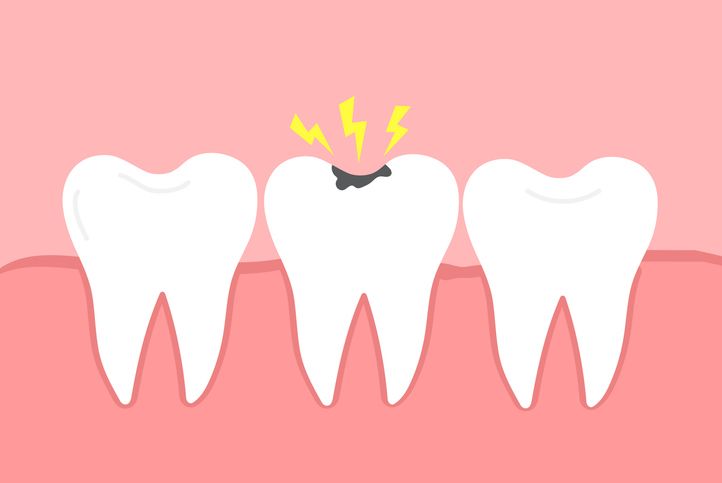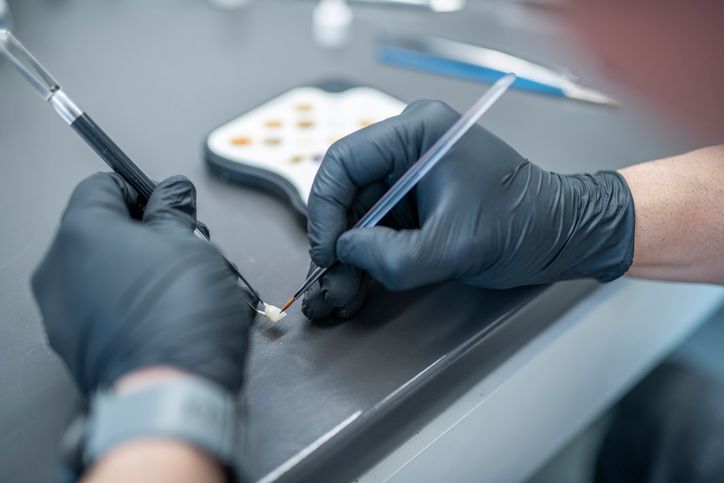August 15, 2025
Whether you're straightening your teeth with traditional braces or using clear aligners like Invisalign, you're investing in a confident, healthy smile that can last a lifetime. But there's one thing many patients (and parents) don't expect, just how much extra effort it takes to keep teeth cavity-free during this time. Braces and aligners introduce new challenges for oral hygiene, from food getting trapped around brackets to aligners holding plaque against enamel, the risk of tooth decay increases. Left unchecked, cavities can delay your treatment, damage your teeth, and even result in permanent white spots or staining after your braces come off. That's why Severns Dentistry & Orthodontics takes a proactive approach to dental care during orthodontics. We know a straight smile is only half the goal; long-term health and aesthetics matter too. As your trusted provider of cosmetic dentistry in McMurray, PA, we're here to help patients protect their teeth with compassionate care and education tailored to each stage of their orthodontic treatment. This guide is for: Parents of kids or teens in braces or aligners Adults straightening their smiles Anyone searching for expert guidance on orthodontics in McMurray and how to stay cavity-free throughout treatment Whether you're early in your orthodontic journey or approaching the finish line, you'll find helpful tips, practical strategies, and reassurance in the pages ahead. Why Cavities Are More Common During Orthodontic Treatment Even patients who maintained excellent oral hygiene before starting braces or Invisalign often find themselves surprised by how quickly plaque builds up once their orthodontist introduces orthodontic appliances. Suddenly, brushing takes longer, flossing becomes more complicated, and even daily routines need to be modified. But this increased challenge isn't just a nuisance—it significantly raises the risk of cavities, especially if you're not prepared. Let's take a closer look at why tooth decay becomes more likely during orthodontic treatment and what warning signs patients and parents should watch for. Braces Trap Food and Plaque The brackets and wires that make braces so effective at aligning teeth also create dozens of tiny nooks and crannies, which are perfect hiding spots for food particles and plaque. Sticky snacks, starchy foods, and even healthy options like fruit can get caught around brackets and under wires. If you don't thoroughly clean these areas, plaque begins to form. Plaque is a sticky film made up of bacteria mixed with food debris and saliva. When left on teeth, the bacteria feed on sugars and release acids that slowly erode enamel. This demineralization process can result in: White spot lesions, which appear as chalky marks and are early signs of enamel breakdown Cavities around the brackets often require tricky mid-treatment fillings. Gum inflammation and bleeding, leading to gingivitis and discomfort during treatment. Clear Aligners Can Seal in Bacteria Patients using Invisalign or other clear aligners often assume they're at lower risk for cavities because the trays are removable. When used correctly, aligners can make brushing and flossing easier. However, they can also become a bacterial trap. If a patient eats something sugary or acidic and then puts their aligners back in without brushing, they seal harmful acids against the enamel for hours at a time. This constant exposure can lead to erosion, white spots, and decay. Additionally, aligners themselves can harbor bacteria if not cleaned daily, contributing to: Bad breath Plaque buildup on the aligners and teeth Decay near the gumline where trays hug tightly Cleaning Is Harder for Everyone Orthodontic appliances make even the most basic hygiene routines more difficult. With braces, patients need to brush above, below, and around each bracket, taking extra care to get beneath the archwires. Flossing, which was once a 1-minute task, now requires floss threaders or special orthodontic picks. Clear aligners may eliminate physical barriers, but they introduce a new kind of discipline. Patients must brush and floss after every snack or meal before reinserting trays. Younger kids may forget, teens may rush, and adults with packed schedules may cut corners. Over 12–24 months of treatment, these shortcuts add up. Areas to Pay Special Attention to When Brushing and Flossing During orthodontic treatment, decay often forms in specific trouble areas. These include: The backs of molars, which are hard to reach but vulnerable to buildup Interproximal spaces (between the teeth), where flossing is crucial Under and around brackets, especially close to the gumline Along the edges of aligners, where tight contact can trap debris and acids Understanding these risks is the first step in preventing cavities. With awareness, the right tools, and support from our dental team, you can protect your smile while you straighten it. Braces vs. Clear Aligners: Which Poses Greater Cavity Risk? When it comes to straightening teeth, both braces and clear aligners are effective tools—but they come with very different oral hygiene challenges. Each method introduces specific risks that can impact cavity development, depending largely on how well a patient adapts their daily care routine. Let's take a deeper look at how cavity risk differs between traditional metal braces and removable aligners like Invisalign, and what patients (and parents) need to know to stay ahead of problems. Cleaning Challenges with Braces Braces are fixed appliances bonded directly to the teeth. They include brackets, wires, and rubber bands, all of which can collect food particles, plaque, and bacteria if not cleaned meticulously. Here's why they make oral hygiene more difficult: Food easily sticks to metal components, especially after meals and snacks. Sticky or starchy foods can become lodged around brackets and behind wires. Brackets and wires block bristles from reaching the full tooth surface, especially near the gumline. Flossing is more complicated, requiring either floss threaders or specialized orthodontic floss picks to work around wires. Toothbrush angles must be adjusted—you can't just brush head-on. You have to brush above, below, and directly on each bracket, making the process slower and more technique-driven. Even patients with excellent brushing habits may accidentally miss certain areas, leading to plaque buildup, demineralization, and eventual decay. The risk is especially high for younger patients who may not yet have developed the dexterity or discipline to brush thoroughly. Cleaning Challenges with Clear Aligners Clear aligners like Invisalign offer a more discreet and flexible approach to orthodontics. Because they are removable, they allow patients to brush and floss their natural teeth without obstruction. That sounds easier, but in practice, aligners come with their own set of concerns: Some patients skip brushing after eating or drinking, putting trays back in over unclean teeth, which traps bacteria and sugars against the enamel. When you wear aligners, saliva doesn't reach the teeth, which reduces the natural rinsing action that helps neutralize harmful acids. If not correctly cleaned daily, aligners can harbor bacteria, creating a cycle of plaque reintroduction with every wear. Drinking anything but water with trays in allows sugars and acids to become sealed against the teeth, essentially marinating enamel in decay-causing substances. So while aligners may be less physically obstructive, they demand a higher level of personal responsibility and consistency to prevent cavities. So Which One Is "Safer" for Your Teeth? The answer isn't one-size-fits-all. In truth, both systems can be safe or risky, depending on the patient's hygiene habits and level of diligence. Braces are always on, which makes them predictable but more challenging to clean. They may be better suited for patients who benefit from a structured routine or those who struggle with the temptation to remove aligners too often. Aligners offer convenience, but they require patients to follow strict hygiene protocols such as brushing after every meal or drink (besides water), cleaning the trays daily, and wearing them for the full 20–22 hours a day. Patients who are consistent and detail-oriented may find aligners easier to manage. Younger children or those who need more structure may do better with braces and extra hygiene support. That's why the team at Severns Dentistry & Orthodontics doesn't take a one-size-fits-all approach. We carefully assess each patient's lifestyle, age, and health habits before recommending a treatment plan. Once you begin orthodontic care, we provide personalized hygiene instructions, plus tips, check-ins, and encouragement to help every patient succeed. Whether you wear brackets or trays, Severns can help you maintain strong, healthy teeth throughout the journey. At-Home Strategies to Prevent Cavities While your dental team at Severns Dentistry & Orthodontics is here to provide professional cleanings, evaluations, and preventive care, you can build the foundation of a cavity-free smile during orthodontic treatment at home. Especially during the months or even years you'll be wearing braces or aligners, your daily routine becomes the most critical defense against decay. This responsibility often falls on parents of younger children. For teens and adults, it requires discipline and habit-building. The good news? With the right tools and consistent routines, preventing cavities at home is completely achievable. Let's break down everything you need to stay on track, from brushing and flossing to nutrition and hygiene checklists for every age. Brushing Tips: The First Line of Defense Brush after every meal. The rule of thumb during orthodontic treatment is to brush at least three times a day: after breakfast, after lunch, and before bed. For Invisalign users, it's essential to brush before putting trays back in to avoid trapping food or acids against your teeth. Use a soft-bristled or electric toothbrush. Soft bristles are more gentle on enamel and gums, which is essential when teeth and tissues may already be tender from shifting. Electric toothbrushes (especially those with orthodontic heads or timers) are highly effective at removing plaque and reducing user error. Choose fluoride toothpaste Fluoride helps strengthen enamel and reverse the early stages of demineralization. Use a pea-sized amount and make sure it's an ADA-accepted formula. Some patients may benefit from prescription-strength fluoride toothpaste. Ask your dentist if that's right for you. Mind your angles For braces: Tilt your toothbrush to clean above, below, and directly around each bracket. Don't forget the gumline! For aligners: Focus on brushing every exposed surface of the teeth, especially the biting edges and spots where the trays fit snugly. Take your time Brush for a full two minutes. Try setting a timer, using a song, or using an electric brush with a built-in pacing feature. For kids, make brushing fun with reward charts or brushing apps. Flossing & Interdental Cleaning: No Skipping Allowed Flossing becomes more challenging with orthodontic appliances—but it's just as important, if not more so, during treatment. Plaque and food particles love to hide between teeth, and these areas are common sites for cavities to begin. Floss threaders Threaders allow you to slide traditional floss underneath wires. It takes time, but it is very effective. Orthodontic floss picks These pre-threaded tools are excellent for teens and kids who may not have the patience for threaders. They're also handy for school or sports bags. Water flossers A water flosser (like Waterpik) is a fantastic tool for patients with braces or fixed retainers. It uses a stream of pulsating water to dislodge food and debris from between teeth and under wires. Daily commitment matters Whatever tool you choose, floss at least once a day—ideally before bed. Flossing helps protect the spaces that braces and brushes can't always reach. Mouthwash and Fluoride Rinses: A Powerful Supplement While not a substitute for brushing and flossing, rinses are a powerful addition to your routine—especially during orthodontic treatment. Fluoride mouthwash helps remineralize enamel and offers extra protection in areas that braces make hard to clean. Antibacterial mouthwash helps fight plaque and gum inflammation. Choose an alcohol-free version to avoid irritation. Kid-friendly flavors make it easier for younger patients to stick with the routine. Always supervise children to ensure they spit out the rinse instead of swallowing. Use mouthwash once or twice daily, especially after nighttime brushing, for a cleaner, stronger smile. Tray Care for Invisalign and Clear Aligners If you're using clear aligners, remember that keeping your trays clean is just as important as cleaning your teeth. Dirty trays can harbor bacteria, discolor, and contribute to tooth decay. Clean trays daily Use mild soap or Invisalign-approved cleaning crystals—not toothpaste, which is too abrasive. Avoid hot water Heat can warp your trays and make them fit incorrectly. Rinse throughout the day. Give trays a quick rinse after removing them and before putting them back in. Use a clean case Never store trays loose in your pocket, bag, or on a napkin. Bacteria and debris can cling to them and get transferred to your mouth. Always put trays back on clean teeth Never pop them back in without brushing and flossing first. Foods to Avoid During Orthodontic Treatment Certain foods are bad for teeth, can damage your appliance, delay treatment, and increase your risk of cavities. Avoid sticky, chewy candies like taffy, gummies, caramel, and fruit snacks Say no to hard candies and anything you have to bite or crunch, like lollipops and ice Limit sugary drinks, including soda, juice, energy drinks, and sweetened teas Be mindful of snack bars, dried fruits, and granola, which can be sticky These foods can lodge in brackets, break wires, or slip under aligners and sit on your teeth undisturbed. Smile-Friendly Nutrition Tips Good oral hygiene also starts with a healthy diet. Choose foods that naturally clean your teeth, support enamel, and stimulate saliva production: Raw vegetables like carrots, celery, and cucumbers Dairy products like cheese and yogurt, which are rich in calcium Nuts and seeds (if safe for your appliance), which offer vitamins and protein Sugar-free gum, which helps produce saliva to rinse away acids naturally Plenty of water, which hydrates your mouth and washes away food debris Pro tip: Water is the only beverage that's safe to drink while wearing aligners. Daily Oral Care Checklists To help patients and families stay organized, here are tailored daily checklists by age group: Kids (Ages 7–12) Brush twice daily with adult supervision Use fluoride toothpaste Rinse with fluoride mouthwash at night Floss with help or use floss picks Limit sugary drinks and sticky snacks Visit the dentist regularly for progress checkups Teens (Ages 13–18) Brush after every meal (3x/day) Clean aligners or brackets thoroughly Floss nightly using a water flosser or picks Use a fluoride rinse or antibacterial mouthwash Avoid energy drinks, gum, and chewy snacks Keep an oral care kit in a backpack or locker Adults Brush after meals, especially before reinserting aligners Use a high-quality electric toothbrush Floss daily Rinse with fluoride mouthwash nightly Store aligners safely and sanitize trays regularly Stick to routine dental visits At-home care doesn't have to be overwhelming. With the right tools, consistent habits, and a bit of planning, you can prevent cavities and protect your investment in a healthier smile. And remember, Severns Dentistry & Orthodontics is here to support you every step of the way. What to Expect at Severns Dentistry & Orthodontics More Frequent Cleanings We may recommend professional cleanings every 3–4 months instead of the standard 6, especially for high-risk patients. Preventive Treatments We offer: Fluoride varnish to strengthen enamel Dental sealants on molars to prevent decay Orthodontic evaluations that include hygiene checks One-on-One Education Our hygienists take time during each appointment to: Review brushing and flossing techniques Demonstrate any tools you may need Customize tips for your lifestyle What Happens If You Get a Cavity During Orthodontic Treatment? Despite best efforts, cavities sometimes happen. But don't panic—treatment is possible, and we'll guide you through it. If You Have Braces Minor cavities can usually be treated with brackets in place For larger restorations, we may remove and reattach a bracket We coordinate with your orthodontist to avoid delaying treatment If You Use Aligners Remove your aligners for filling procedures If the tooth shape changes, we may need to re-scan for a new tray In severe cases, treatment may pause briefly to address dental health What's most important is catching decay early—before it progresses. That's why regular visits and open communication are so critical. Post-Orthodontic Oral Health: Protecting Your New Smile Your braces are off, or you have finished with your last tray- congratulations! But your oral hygiene journey isn't over yet. Retainer Hygiene Clean your removable retainers daily Avoid soaking in alcohol-based cleaners Store in a ventilated case when not in use Flossing is still essential for bonded retainers. Use threaders or a water flosser to prevent plaque buildup. Whitening and Remineralization After treatment, we can help: Remove lingering stains Whiten teeth safely with professional-grade options Remineralize weak enamel to reduce white spots We'll recommend a post-treatment plan that supports both health and aesthetics. Continue Regular Dental Visits We encourage all ortho patients to maintain: Cleanings every 6 months Annual fluoride treatments, especially for teens Ongoing evaluations for long-term oral health Severns Dentistry offers comprehensive follow-up care to protect your results and confidence. A Beautiful Smile Starts with Healthy Habits Straight teeth are just the beginning. Whether you're a parent overseeing your child's care or an adult navigating orthodontics for the first time, preventing cavities is a daily priority—and a team effort. At Severns Dentistry & Orthodontics, we empower patients with the knowledge, tools, and in-office support they need to stay on track. From braces to aligners and beyond, your smile is in great hands. Schedule an appointment today with McMurray's trusted experts in cosmetic dentistry and orthodontics.












